Peter Frankopan "The Silk Roads: A New History of the World" Bloomsbury Publishing)

This is an interesting encouragement to look more eastern-wards for a greater appreciation of what happened during history. During my degree, many years ago, I did study alongside The Renaissance and Reformation periods, the Enlightenment, and Classical Civilization and often wondered why we only studied Roman and Greek History and not Persian, Indian, Chinese, and Egyptian history during the course, and I commented during my History lectures on the Crusades that it was more about money and trade than religion, which got laughs from my fellow students and correction from the lecturer on their assumptions (I felt very vindicated). So, this is a book for people who don't seem to think that there is anything that has come out of the middle east except terrorists, but unfortunately people who believe these things don't tend to believe that this is a book for them.
This is a book that looks at how influential parts of the world dismissed by people were on actual history, not only of their own countries but on the world, and how ignoring those influences is toxic, a reductio ad absurdum of reality.
Although the "Silk Roads" of the title is intended as a metaphor, expressing the east-west/west-east movement of beliefs and ideals as well as the exchange of goods, the metaphor itself pushes Frankopan unerringly toward finding his explanations in economic factors. In the case of, say, World War I, this produces a shrewd counter-narrative to the traditional British account of brave and sacrificial soldiers resisting German aggression ("inspired," in Winston Churchill's words, "not only by the love of country but by a widespread conviction that human freedom was challenged by military and Imperial tyranny"). Frankopan instead centers his admirably succinct (13 pages!) account of the Great War around the establishment of the Anglo-Persian Oil Company and the Ottoman threat to the shipping traffic in the Suez Canal. These commercial interests become the core of the matter, the stacked tinder just waiting for the match; Gavrilo Princip's bullets are almost incidental. It's a somewhat reductionist version, yes, but one-volume world histories have to reduce somewhere, and Frankopan's oil-centered analysis allows him to point directly (and accurately) forward from 1914-1918 to the present: the "control of Persia's crown jewels [by] foreign investors led to a deep and festering hatred of the outside world, which in turn led to nationalism and, ultimately, to a more profound suspicion and rejection of the west best epitomized in modern Islamic fundamentalism."
Yes, we need a more holistic view of history, but it's a hard task for anyone, history will always be filtered by experience, knowledge, access to information, and upbringing, bias can be acknowledged but will always creep in, the trick is to understand that it will always be there.
(

This is an interesting encouragement to look more eastern-wards for a greater appreciation of what happened during history. During my degree, many years ago, I did study alongside The Renaissance and Reformation periods, the Enlightenment, and Classical Civilization and often wondered why we only studied Roman and Greek History and not Persian, Indian, Chinese, and Egyptian history during the course, and I commented during my History lectures on the Crusades that it was more about money and trade than religion, which got laughs from my fellow students and correction from the lecturer on their assumptions (I felt very vindicated). So, this is a book for people who don't seem to think that there is anything that has come out of the middle east except terrorists, but unfortunately people who believe these things don't tend to believe that this is a book for them.
This is a book that looks at how influential parts of the world dismissed by people were on actual history, not only of their own countries but on the world, and how ignoring those influences is toxic, a reductio ad absurdum of reality.
Although the "Silk Roads" of the title is intended as a metaphor, expressing the east-west/west-east movement of beliefs and ideals as well as the exchange of goods, the metaphor itself pushes Frankopan unerringly toward finding his explanations in economic factors. In the case of, say, World War I, this produces a shrewd counter-narrative to the traditional British account of brave and sacrificial soldiers resisting German aggression ("inspired," in Winston Churchill's words, "not only by the love of country but by a widespread conviction that human freedom was challenged by military and Imperial tyranny"). Frankopan instead centers his admirably succinct (13 pages!) account of the Great War around the establishment of the Anglo-Persian Oil Company and the Ottoman threat to the shipping traffic in the Suez Canal. These commercial interests become the core of the matter, the stacked tinder just waiting for the match; Gavrilo Princip's bullets are almost incidental. It's a somewhat reductionist version, yes, but one-volume world histories have to reduce somewhere, and Frankopan's oil-centered analysis allows him to point directly (and accurately) forward from 1914-1918 to the present: the "control of Persia's crown jewels [by] foreign investors led to a deep and festering hatred of the outside world, which in turn led to nationalism and, ultimately, to a more profound suspicion and rejection of the west best epitomized in modern Islamic fundamentalism."
Yes, we need a more holistic view of history, but it's a hard task for anyone, history will always be filtered by experience, knowledge, access to information, and upbringing, bias can be acknowledged but will always creep in, the trick is to understand that it will always be there.
(
